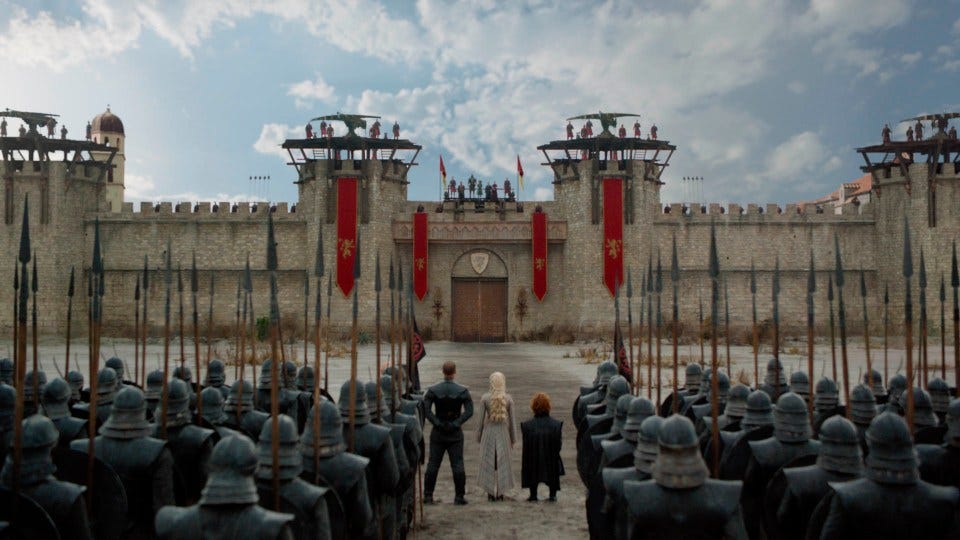Daenerys Targaryen, Humanitarian
So she burned half a city. The other half's still standing, isn't it?
Okay, full disclaimer. I did not watch the entirety of Game of Thrones, in fact, I watched season 1 in high school, liked it and sort of forgot about it, and then watched season 8 with my wife during the peak finale hype era of 2019. So let’s just say I’m missing a lot of context for the events of the series, hence my unusual perspective.
Sub-disclaimer: This blog does not endorse the sacking and burning of cities.
Daenerys Targaryen is a Merciful Queen
Let us discuss Daenerys Targaryen, The First of Her Name.
Daenerys is one of the main characters from the TV series Game of Thrones, and a complex character whose meteoric rise and inexplicable fall mirrors the rise and fall of the show’s popularity. She spends most of the show building alliances, taking cities, being generally nice to people and children with only occasional references to slaughtering her enemies and burning their towns. But she stumbles at the last hurdle — at the very moment she finally regains her birthright, the capital city of Westeros and the dominion of the world, her traitorous advisors kill her and give her body to a dragon. So passes Daenerys, daughter of Aerys, rightful Queen of Westeros.
I vividly recall the internet’s (and my friends’) reactions to the sack of King’s Landing in the penultimate episode of Game of Thrones. Almost universally, people were appalled by Daenerys burning the capital and its citizens after the city’s surrender. Even the in-universe characters were appalled! How could she do this? But even while watching it, I thought her actions both:
Made perfect sense as a response to rebellion, and
Were rather tame by the standards of ancient and medieval warfare.
Hence, I claim that Daenerys Targaryen, the first of her name, is not an appalling monster, but actually rather merciful, and her spineless and craven advisors must have dug up a treasure trove of twenty-first century moral compasses somewhere in the intervening seasons, or they would think so too.
The Siege and Sack of King’s Landing
Just to make sure we’re all on the same page, let’s summarize the events before, during, and after the climactic battle. I particularly recommend this video by Invicta (who actually makes a lot of the same points that I do!).
Belligerents
Queen Cersei Lannister leads the Lannister forces, including sub-units of Iron Fleet navy, Golden Company infantry. She currently holds King’s Landing, and is in rebellion against Daenerys.
Queen Daenerys Targaryen leads the Targaryen forces, including sub-units of Unsullied (Eastern) infantry, Northmen, and Dothraki (steppe) cavalry. She is the mostly-acknowledged rightful queen.
Preparation and Pre-Battle Moves
Cersei strengthens her position by allying with the Iron Fleet and hiring the Golden Company to bolster her defenses.
Missandei (one of Daenerys’ chief advisors and a personal friend) suggests a “hearts-and-minds” campaign strategy to defeat Cersei, which Daenerys rejects as impractical.
Jon and Tyrion (more advisors to Daenerys) propose a siege, starving out King’s Landing, to which Daenerys accedes.
Inexplicably, Daenerys splits her forces into a land contingent and sea contingent, and marches/sails to King’s Landing.
The Iron Fleet ambushes Daenerys, shooting down her dragon Rhaegal. Missandei is captured.
The Siege
Daenerys’ army reaches King’s Landing, camps outside the walls, and begins the siege.
Daenerys and Cersei meet outside the walls, in a sort of parley/negotiation. Missandei is executed by Cersei as a deliberate insult.
Daenerys’ army begins the siege of King’s Landing, inexplicably (again) without any siege weapons.
Tyrion urges Daenerys to allow the surrender of King's Landing if the city’s bells ring. Daenerys … agrees? Maybe?
The Battle
Daenerys launches a surprise attack on the Iron Fleet with Drogon the dragon, effectively destroying it.
Daenerys and Drogon then target the city’s defenses directly, decimating the Golden Company outside the city gates and the scorpion artillery on the walls.
Following the aerial dragon attack, Daenerys’ forces breach the city gates and engage the Lannister forces.
Surrender and Sack
As Daenerys' forces gain the upper hand, the Lannister soldiers start surrendering. The citizens of King's Landing cry out for the bells to ring, which Cersei ignores. The citizens ring the bells anyway.
Despite the surrender, Daenerys continues her assault, burning much of the city and killing many civilians and soldiers.
Aftermath
The battle concludes with King's Landing in ruins and a significant portion of the population dead from fire, collapsing buildings, and street combat.
Daenerys takes control of the ruined city and addresses her forces, promising further conquests. Jon and Tyrion, those pansies, are horrified.
Overall, this is a fairly typical progression of a city siege. To recap for later sections, I want to highlight a very important series of events.
Daenerys lays siege to King’s Landing
There are some pseudo-negotiations between Cersei and Daenerys, in which Cersei rejects any surrender by murdering an advisor/friend of Daenerys
Daenerys’ army breaks into the city by force.
The city (though not Cersei) surrenders.
At this point, should Daenerys lay down her arms and accept this surrender? To answer this question, let’s look at the rules of ancient warfare, to see what our ancestors might have done.
The Ancient Rules of War
I will use the Romans as the prototypical example to illustrate the way the ancients conducted war, and what they thought of as “fair play.” Roman history is great for this, as it’s well-studied and involves pithy Latin phrases that make good section titles.
Murum aries attigit
The ram has touched the wall
-Julius Caesar, De Bello Gallico 2.32
Murum aries attigit is one of the more impressive turns of phrase from Julius Caesar’s Commentaries on the Gallic War.1 It is Latin, and translates literally to “the [battering] ram has touched the wall.”
In ancient warfare, the moment where the first siege weapon touches the city wall is the dividing line between prelude and siege. Sieges are important, because they are hated by both beseiger and beseiged alike — during a siege, most everyone is bored, starving, and dying of disease, sometimes literally for years.
And so before the main assault begins, you, as the city’s ruler, have all sorts of options. Most importantly, you can surrender, with a decent chance to live through the process, if you’re not particularly irritating or dangerous.
But after the ram touches the wall, it’s on. And if the enemy breaks into your city, they can do anything they want to you, even if you surrender, and no one will bat an eye. After all, if you could surrender at any time and be immune to the natural consequences of resistance (mass murder, pillage, rapine, etc.), why would anyone surrender before the siege?
Vae victis
Woe to the vanquished
-Titus Livius, Ab Urbe Condita 5.48
A still more impressive phrase from classical Latin, vae victis translates to “woe to the vanquished,” and is the malevolent complement of “to the victor go the spoils.” This phrase comes from the historian Livy, who tells the history of the first sack of Rome after a siege by the Gauls (ancient, barbarian Frenchmen), in 390 BC.
At last not only food but hope failed [the Romans]… The army insisted that they should either surrender or purchase their ransom on the best terms they could, for the Gauls were throwing out unmistakable hints that they could be induced to abandon the siege for a moderate consideration…
A conference took place between Q. Sulpicius, the consular tribune, and Brennus, the Gaulish chieftain, and an agreement was arrived at by which 1000 lbs. of gold was fixed as the ransom of a people destined ere long to rule the world.
This humiliation was great enough as it was, but it was aggravated by the despicable meanness of the Gauls, who produced unjust weights, and when the tribune protested, the insolent Gaul threw his sword into the scale, with an exclamation intolerable to Roman ears, ‘Woe to the vanquished!’
-Titus Livius, Ab Urbe Condita 5.48.
In other words, the Gauls tried to cheat the surrendering Romans out of their gold with extra-heavy weights, and when the Romans noticed, the Gallic chieftain threw his sword on the Gallic side of the balance, and said “sucks to be you, pay up.” And the Romans did. What else could they do?
Interestingly, Jeremy Armstrong in his book, War and Society in Early Rome, gestures at the idea that this incident was a sort of foundational trauma for the Roman state. When Rome rose again after the sack, it was a mutated society — militaristic, community-oriented, and brutally punitive to vanquished enemies.
Quod ubique, quod semper, quod ab omnibus creditum est
What is everywhere, always, and by all people believed
-Saint Vincent of Lérins
I would like to emphasize that though I used the Romans to illustrate my point, these general principles are near-universal before very recent history. The clearest example I know of, where these rules are literally spelled out, comes from the Hebrew Bible, in Deuteronomy.
When thou comest nigh unto a city to fight against it, then proclaim peace unto it.
And it shall be, if it make thee answer of peace, and open unto thee, then it shall be, that all the people that is found therein shall be tributaries unto thee, and they shall serve thee.
And if it will make no peace with thee, but will make war against thee, then thou shalt besiege it.
And when the Lord thy God hath delivered it into thine hands, thou shalt smite every male thereof with the edge of the sword.
But the women, and the little ones, and the cattle, and all that is in the city, even all the spoil thereof, shalt thou take unto thyself; and thou shalt eat the spoil of thine enemies, which the Lord thy God hath given thee.
-Deuteronomy 20:10-14, King James Version
It is with these rules of war in mind that we must evaluate Daenerys’ conduct.
Conduct in Context
We see that far from being outside the norms, or unusually harsh, Daenerys’ behavior is actually quite proper for an ancient ruler.
First of all, King’s Landing was given a chance to surrender peacefully. Cersei said no, in rather dramatic fashion by executing Daenerys’ advisor. Daenerys burned (most of) her city in response. Perfectly fair!
This incident has many historical parallels, but the first one I thought of was the Mongol reaction to a Khwarazmian city’s killing of Genghis Khan’s son-in law, named Toquchar. Here is what the Khan’s son Tolui did to it in revenge for Toquchar’s death:
Tolui arrived at the city on 7 April and the inhabitants, awed by the size of his force, immediately sought to agree surrender terms. Because the killing of the khan's son-in-law had been a grave insult to the Mongols, all proposals were rejected; the assault had begun before the end of the day, with the walls being breached on 9 April and the city captured the next day…
Toquchar's widow supervised the massacre of the entire population of the city, with the exception of 400 craftsmen. Unlike in Merv, all children were killed, and the corpses of the alleged 1,747,000 victims, including all the cats and dogs in the city, were piled in great heaps. The ground was subsequently ploughed over.2
Thus we see that Daenerys’ conduct at King’s Landing is well within the historical norms for her spiritual cousins (the Dothraki being a pseudo-Mongol horde), even relatively tame. I would say she shows remarkable restraint by comparison in leaving King’s Landing a standing city at all, complete with live dogs and cats, despite the holier-than-thou handwringing by her treacherous advisors, Jon Snow and Tyrion Lannister.
Daenerys is, generally, portrayed as generous to her friends and subjects, and horrifically violent to her enemies and those who rebel against her rule. Cersei is undoubtedly in rebellion by this point in the series, and empires the world over have developed various strategies for deterring this sort of thing. Let’s use my favorites, the Assyrians, to illustrate how a rebellious noble might be treated.3
I flayed as many nobles as had rebelled against me [and] draped their skins over the pile [of corpses]; some I spread out within the pile, some I erected on stakes upon the pile … I flayed many right through my land [and] draped their skins over the walls.
-Ashurnasirpal II, King of Assyria
Again, Daenerys acts in concert with her historical parallels, but with less flaying and more fire, befitting her image. Furthering the comparison to an Assyrian monarch, Daenerys has impeccable, bloodthirsty one-liners that would make Ashurnasirpal proud. In fact, let’s do a side-by-side comparison.
Here’s our lovely queen, talking about the Masters of a city called Meereen:
I will crucify the Masters. I will set their fleets afire, kill every last one of their soldiers, and return their cities to the dirt.
-Daenerys Targaryen
And here’s another spiritual cousin of hers, Tiglath-Pileser I, explaining what he does to cities that do not submit:4
The countries of Tsaravas and Ammavas, which from the olden time had never submitted, I swept like heaps of stubble... The ranks of their fighting men I levelled like grass. I bore away their gods; their movables, their wealth, and their valuables I carried off. Their cities I burnt with fire, I destroyed and overthrew, and converted into heaps and mounds. The heavy yoke of my empire I imposed on them.
-Tiglath-Pileser I, King of the Universe, King of Assyria
She even has an Assyrian-style name!
The First of Her Name, the Unburnt, Queen of Meereen, Queen of the Andals and the Rhoynar and the First Men, Khaleesi of the Great Grass Sea, Breaker of Chains and Mother of Dragons — Daenerys Targaryen is the very model of strong Assyrian king!
Though really, only one name, and only six titles? Is she a peasant, to be thus degraded?
But… a Targaryen Humanitarian?

Well, perhaps I exaggerate a bit, but I just couldn’t resist the rhyme.
Throughout the series, you could indeed call Daenerys a proto-humanitarian, what with all the time she spends freeing slaves, being pleasant to children, and other nice things (nice for us, anyway, the Romans would not have appreciated freeing slaves, or being nice to children).
But first and foremost, she is a conqueror, and to their credit, the showrunners generally make her act like one. She makes poor tactical decisions, but the logic of power is actually quite sound, and very much in-line with historical norms, even if the eighth season puts an out-of-character twenty-first century spin on the morality of it. Making an example out of King’s Landing to deter future rebellion is a politically savvy and historically accurate choice. It will save more lives in the long run! Maybe!
Of course the Assyrians, after three hundred years of running an empire exactly like this, were so hated that when their subjects inevitably revolted, they literally erased the the Assyrian civilization from the Earth. So I suppose there are some drawbacks to the flaying-based approach to deterring rebellions. Certainly, Daenerys’ subsequent vilification by her former subjects tends to argue against this approach, and it is always worth remembering that history is written not by the victors, but by the screenwriters.
And as if to emphasize that point, after the tragic death of our heroine, her dragon apparently turns into an anti-monarchist partisan, and symbolically burns the Iron Throne.
So maybe we shouldn’t give the writers too much credit for historical accuracy. But we can try!
Gaius Julius Caesar, De Bello Gallico, Book 2, Chapter 31











In the series, it is Essos which is based on classical antiquity, while Westeros is a feudal medieval civilization. Arguably, being born between worlds is exactly what gives Daenerys all her troubles, trying to impose Western norms while in Essos and then behaving as an eastern despot when she begins her reconquest.
Thanks, excellent read